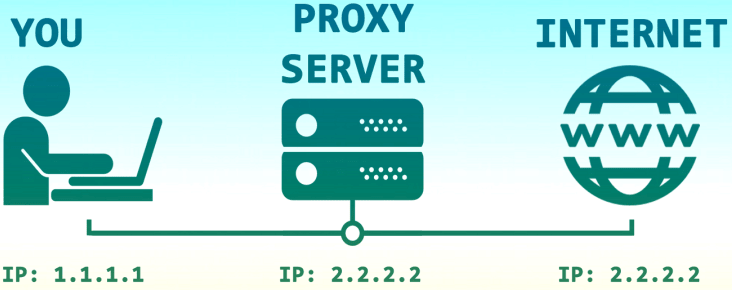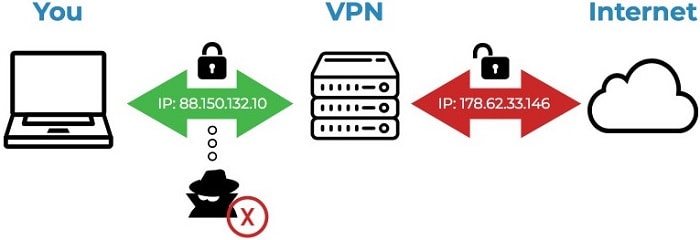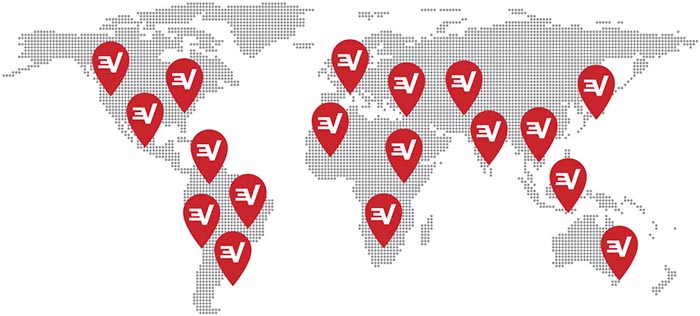This article has been just updated: January 16, 2024
Maintaining your online privacy is of great concern to many individuals. There are many reasons that you might want to engage in online activities anonymously. You might be geo-blocked which restricts you from reaching certain websites or accessing particular content that interests you. Censorship by your government, company, or other organization may limit your ability to freely move around the web. Maybe you just don’t like the idea of anyone, like your ISP, monitoring and tracking the websites that you visit.
Two ways to combat this intrusion into your online freedom are to employ an Online Web Proxy or a Virtual Private Network (VPN) service. Let’s take a look at why you might need these tools and how these methods work. Then we will compare them to see which one will work best for the particular kind of online activity that you plan on conducting.
Online Privacy and Your IP Address
The key to tracking and identifying anyone online is their IP address. Whenever you go online, you are assigned an IP address by your ISP or the network to which you have connected. This public IP address is presented to every website and computer you visit while online.

Your IP address can reveal a substantial amount of information about you and your location. The data that can be obtained from your IP address includes the ISP which owns the IP address and known services that are running at that address. It also provides information regarding the country, region, and city where the IP is located. An IP address can give an estimate of the latitude and longitude of the user as well as a regional area code.
While your name and email address cannot be obtained from your IP address, as you can see, many details can be seen by anyone who cares to look. Having this information at their disposal is how ISPs or other agencies block or limit your access to sites they deem inappropriate for you to visit. The same data can be used by unscrupulous advertisers or hackers to flood you with ads or conduct phishing expeditions.
As you can see, there are many valid reasons why you might want to keep your IP address private. You have some options with which to maintain your online anonymity. Let’s take a look at how they work.
What is an Online Web Proxy?
A web proxy is essentially an intermediary between you and the websites you visit. You log into the proxy server and then your Internet traffic flows through the proxy server before traveling to the website that you want to access. The proxy server forwards your request to the website, using its own IP address rather than your public IP address. This effectively masks your identity from the sites you visit.
What is a VPN Service?
Another popular way to protect the privacy of your online movements is through the use of a VPN service. Using a VPN service also masks your IP address in a similar fashion. When you are about to go online, you connect to one of the VPNs servers which routes your traffic to its destination using its IP address instead of your own public IP address. A VPN also encrypts your data so it cannot be compromised as it travels through the Internet.

VPN vs. Online Web Proxy
These two solutions to the online privacy issue appear at first glance to be very similar, and in fact, they are. But there are some differences which may make one more preferable for your particular situation.
Let’s look at how a proxy and VPN differ and how their differences can affect you.
1 Hiding Your IP Address
Both a VPN and an online web proxy will prevent your computer’s public IP address from being revealed when you are visiting websites. Since the proxy runs through your browser, only traffic initiated in your browser will mask your IP address. VPNs will hide your IP address from view no matter which application initiates the online connection.
2 Encryption
Keeping your IP address hidden will keep your identity private, but it has nothing to do with keeping the data that you transmit safe. In order to protect the data that you send over the Internet, you need to employ encryption. You will usually not get the benefit of encryption from a web proxy, but it is one of the primary features of almost all VPN services.
If you perform any online activity that involves personal or sensitive information, a VPN will offer your data the protection it deserves. Using a VPN is a critical step to take if you use public WiFi. These open Internet access points are often used by individuals seeking to steal and compromise your information. A VPN will thwart their intentions.

3 Setting up a VPN or Proxy Connection
A proxy is accessed by a single application on your computer, usually your web browser. Other online activities such as sending emails will not make use of the proxy and can be used to reveal the IP address of your machine. Setting up your browser to use the proxy entails some level of configuration that you may not appreciate.
A VPN is an installed application which functions at the level of your computer’s operating system. Once you create the connection to the VPN server, all of your online activity is protected. Your emails and any communication that you engage in will be encrypted to protect you and your data’s privacy.
4 Defeating Geo-blocking and Censorship
One of the primary reasons that proxies and VPNs are used is to get around restrictions enforced by governments, localities, or other authority figures. They can both be used to subvert limitations on your online activities, but there are differences that can be important.
A quality VPN will have servers spread throughout various global locations. This enables a user to log into a server located in a different part of the world. Spoofing their location, they can appear to be connecting from a country that does not have the same restrictions they are currently facing. A web proxy does not offer this type of flexibility.

Once you have connected to the site you wish, a VPN will often provide faster and more stable performance, making it a better choice for streaming content or accessing torrent sites.
5 Dedicated IP Addresses
Web proxies may provide users with random IP addresses. When you connect through a VPN service, you are using one of their IP addresses which will result in a safer connection.
6 Logging Your Online Activity
A VPN service will make its logging policy known to the public. In most cases, they claim to keep no logs and will not allow investigators access to your online activity. This is harder to determine when using a proxy server but can be critically important depending on the reasons that you are protecting your privacy.
The owner of your proxy server can be spying on you or readily provide the details of your online activities to authorities. Obviously, this defeats the purpose of hiding your IP address in the first place.
7 Cost
Online web proxies are free to use and can be accessed through your web browser. Free VPN services are available, but if you want to ensure a reliable VPN experience, you should opt for a paid subscription. These will run a few dollars a month depending on the length of the subscription.
Conclusion
VPN servers and online web proxies can both be used to protect your online identity by masking your IP address. Web proxies are great for occasionally subverting geo-restrictions and give you more privacy than you will achieve by simply using a web browser.
The greater level of security offered by a VPN’s encryption capabilities, global distribution of VPN servers, and its ability to protect all of your online activity make a VPN the logical choice for most users. If you value your privacy and the security of your online data transmission, you should look into installing a VPN on your computer as soon as possible.
FAQ
What is the primary function of a VPN?
A Virtual Private Network (VPN) primarily adds security and privacy to private and public networks. It allows users to send and receive data across shared or public networks as if their computing devices were directly connected to a private network, ensuring that their internet activity is encrypted and hidden from ISPs and potential eavesdroppers.
How does an online web proxy work?
An online web proxy serves as an intermediary between your device and the internet, allowing you to browse the web anonymously. When you use a web proxy, your internet requests are routed through the proxy server, which then makes requests to websites on your behalf, masking your IP address in the process.
Can a VPN be used to access geo-restricted content?
Yes, a VPN can be used to bypass geo-restrictions by connecting to a server in a different location. This makes it appear as if you are accessing content from that location, thereby granting access to region-specific websites, services, and platforms that may otherwise be inaccessible from your real location.
Does an online web proxy encrypt internet traffic?
While a web proxy can hide your IP address, it doesn’t typically encrypt your internet traffic like a VPN does. This means that the information you send and receive through a web proxy could potentially be intercepted or monitored by others on the same network.
Is a VPN more secure than a web proxy?
Generally, a VPN is considered more secure than an online web proxy since it encrypts your entire internet connection and internet traffic. This encryption helps protect sensitive data from being intercepted or accessed by unauthorized parties.
Are there any websites that block the access of VPNs or online web proxies?
Yes, some websites and services have measures in place to detect and block the use of VPNs and online web proxies. These websites might have agreements or regulations requiring them to restrict content to certain regions.
Is it legal to use a VPN?
Using a VPN is legal in many countries, but some countries have restrictions or outright bans on VPN usage due to concerns over illegal activities. It’s essential to be aware of and comply with the laws in your specific location. For more information on VPN services, visit NordVPN.
How do online web proxies differ in functionality compared to VPNs?
Online web proxies typically only secure traffic going through your web browser, while VPNs secure all internet traffic from your device. This comprehensive coverage provided by VPNs includes apps, software, and background processes beyond just the browser’s scope.
Can I use a VPN on multiple devices?
Most VPN services offer the ability to connect multiple devices simultaneously. The exact number varies by provider, but this means you can protect various devices such as smartphones, tablets, laptops, and desktops with a single VPN account.
Do online web proxies have data usage limits?
Some online web proxies might have data usage limits, speed constraints, or limited server locations, affecting the user experience and the amount of data you can use while connected to the proxy.
Is it possible to use a VPN for torrenting?
Yes, many VPN services support torrenting and provide the necessary security and anonymity for P2P file-sharing activities. However, it is important to choose a VPN that specifically allows torrenting and has a no logs policy. Check out ExpressVPN, known for being torrent-friendly.
Can online web proxies slow down my internet speed?
Using an online web proxy can sometimes result in slower internet speeds, as your web traffic is being routed through another server, which may not always have the bandwidth or performance capabilities of your direct connection.
Do VPNs protect against malware and viruses?
While VPNs provide privacy and security by encrypting your traffic, they do not inherently protect against malware or viruses. It’s important to use VPNs in conjunction with other security measures such as antivirus software to achieve comprehensive protection.
How do I set up a VPN?
Setting up a VPN typically involves downloading and installing a VPN client from a reputable service provider, selecting a server location, and then connecting to that server. The VPN client will handle the encryption and routing of your internet traffic.
Are there any free VPNs or online web proxies?
Yes, there are free VPNs and online web proxies available, but they may have limitations in terms of bandwidth, server locations, speed, and privacy. It’s often advisable to use paid services for better reliability and security.
Can using an online web proxy bypass internet censorship?
An online web proxy can sometimes bypass internet censorship by obfuscating your IP address, but it may not be as effective as a VPN, which changes your IP address to that of the server’s and encrypts your connection, providing better access to restricted content.
Do VPNs have any impact on online gaming?
A VPN can sometimes improve online gaming by providing a stable connection and potentially reducing ping times if the VPN server is closer to the game server. On the other hand, it might increase latency if the VPN server is far away or if the VPN service has limited bandwidth.
How do I choose between a VPN and an online web proxy?
Your choice between a VPN and an online web proxy should be based on your needs. If you require robust security, privacy, and the ability to encrypt all internet traffic, a VPN would be the better choice. For casual, browser-based anonymity with no need for encryption, a web proxy could suffice.
What are the limitations of using an online web proxy?
The limitations of using an online web proxy include lack of encryption for your internet traffic, potential data caps, slower internet speeds, and less reliability in accessing geo-restricted content compared to a VPN.
Can VPNs prevent my ISP from tracking my internet usage?
A VPN can prevent your Internet Service Provider (ISP) from tracking your internet usage by encrypting your data and routing it through a VPN server, making it difficult for your ISP to monitor your online activities.





